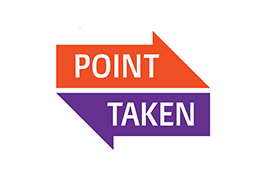May 10, 2016
5/10: Reparations for Slavery in the United States?
Point Taken/Marist National Poll
Although nearly seven in ten Americans oppose paying reparations to African Americans who are descendants of slaves for the harm and racial discrimination caused by slavery, opinion divides along racial lines according to an Exclusive Point Taken-Marist Poll, commissioned by WGBH Boston for its new late-night, multi-platform PBS debate series Point Taken. While white Americans overwhelmingly oppose restitution, a majority of African Americans favor redress. Latino Americans divide.
Nearly six in ten Americans assert the current wealth of the United States is not significantly tied to work done in the past by slaves, although most consider the history of slavery and other forms of racial discrimination to be at least a minor factor in the gap in wealth between white and black Americans. Here too, opinions differ based on racial background.
The national survey was conducted by The Marist Poll in advance of this week’s Point Taken episode, airing Tuesday, May 10th at 11pmET (check local listings) and streaming on pbs.org/pointtaken. The series is hosted by Carlos Watson, Emmy Award winning journalist and OZY Media co-founder and CEO.
68% of residents nationally do not think the United States should pay reparations to descendants of slaves, and a similar proportion of American adults, 72%, argue that the United States should not compensate African Americans, in general, for the harm caused by slavery and other forms of racial discrimination.
White Americans, 81%, are much more likely than African Americans, 35%, and Latinos, 47%, to oppose giving monetary compensation to descendants of slaves. Similarly, 85% of white residents, but, only 32% of African-American adults are against giving reparations to all African-American citizens. Of note, Latinos divide about whether or not reparations should be paid to the descendants of slaves. However, a majority of Latinos, 54%, do not support paying reparations to all African Americans for the harm caused by slavery.
Differences based on generation are also present. Millennials are more likely than older generations to favor paying reparations to, both, the descendants of slaves and the larger African-American community. However, 49% of millennials oppose providing compensation to the descendants of slaves, and a majority, 56%, is against paying reparations to African Americans, in general.
Greater support for reparations exists when the question spotlights private companies who admitted and apologized for profiting from American slavery. Still, 58% of Americans say these companies should not pay money to descendants of slaves, and 65% oppose paying reparations to the larger African American population for the harm and racism stemming from slavery.
Again, differences based on race and generation exist. African Americans, 75%, are more likely than whites, 25%, and Latinos, 54%, to support reparations to the descendants of slaves paid by companies who admit to profiting from slavery. Millennials, 55% are more likely than older Americans to favor these private companies paying reparations.
When it comes to these private companies giving monetary compensation to the overall African-American community, 64% of African Americans and 53% of Latinos, compared with 18% of whites, favor such payments. While a majority of millennials, 51%, oppose such action, they are more likely than their older counterparts to support this proposal.
“These results, while not surprising, are indeed striking in the persistent racial divide in attitudes about reparations. Tonight, Point Taken delves into this sensitive and provocative subject,”says Denise DiIanni, series creator and Senior Executive-in-Charge.
59% of Americans say the current wealth of the United States is not significantly tied to work done in the past by slaves. But, 71% of residents think the history of slavery and other forms of racial discrimination is at least a minor factor in the wealth disparity between white and black Americans. Included here are 40% of residents who believe this is a major factor in the wealth gap.
African Americans, 66%, are more likely than whites, 21%, and Latinos, 44%, to say the wealth of the United States is significantly tied to work done by slaves. Generationally, millennials, 44%, are more likely than older generations to report the current wealth of the United States is significantly tied to work done by slaves. 46% say there is not a significant link.
Spanning all demographic groups, at least a majority thinks the history of slavery and other forms of racial discrimination in the United States is at least a minor factor in the gap of wealth between white and black Americans. However, there are some notable distinctions. 90% of African Americans, compared with 81% of Latinos and 66% of whites, have this view. In fact, 73% of African Americans consider slavery and discrimination to be a major factor in that disparity. Millennials, 56%, are also more likely than other generations to perceive this to be a major factor.
Many Americans, 69%, including half of African Americans, think slavery and racial discrimination is part of the history of the United States, but it is time to move beyond it. 27% believe slavery and racial discrimination is a wrong that still needs to be made right by the U.S. government. Whites, 76%, are more likely than Latinos, 56%, and African Americans, 50%, to think the nation should move beyond this concern. Of note, 49% of African Americans report this is a wrong that still needs to be corrected. Millennials, 57%, are the least likely of the generations to believe it’s time to put the issue of slavery behind the nation and are the most likely to report that it is still a wrong that needs to be made right by the U.S. government, 40%.
This survey of 1,221 adults was conducted April 27th and April 28th and May 2nd through May 4th, 2016 by The Marist Poll sponsored and funded in partnership with WGBH’s Point Taken. Adults 18 years of age and older residing in the contiguous United States were contacted on landline or mobile numbers and interviewed in English by telephone using live interviewers. Results are statistically significant within ±2.8 percentage points. The error margin increases for cross-tabulations.
Complete May 10, 2016 USA Exclusive Point Taken – Marist Poll Release



